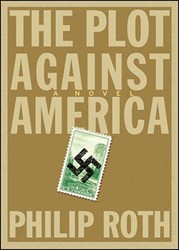
Celebrate Jewish Book Month with #30days30authors! JBC invited an author to share thoughts on #JewLit for each day of Jewish Book Month. Watch, read, enjoy, and discover!
Today, Joseph Kertes, the author of The Afterlife of Stars, writes about the Philip Roth effect.
Of all the writers I have read, Philip Roth has given me the most pleasure as a reader and the most courage as a writer. When I came upon his early works, Goodbye, Columbus and Portnoy’s Complaint, I laughed out loud, of course, but I also realized the power of comedy and satire in literature to reflect the culture — the absurd world we live in, in all of its shades of light and dark. If Shakespeare invented the human, as Harold Bloom postulates, then Philip Roth invented modern humans, caught up in their own neuroses, their own ineptitude, their own anguish, their own puny responses to the giant forces that shape their lives — our lives. And most remarkably, the books read as if they were written in one sitting. One word follows so naturally upon another that they are like musical notes, like Mozart, every word right, as if it wasn’t chosen but dropped onto the page out of the air. There is a breathlessness to the prose, an inevitability always driving us forward.
Roth went on to write many more comedies (The Breast, Zuckerman Unbound, The Anatomy Lesson), but he wrote tragedies too, to use the term loosely (The Counterlife, The Human Stain, American Pastoral). But most remarkably, he blended darkness and light, tragedy and comedy, as if they lived together, as they do in life.
For me, the best example is Sabbath’s Theater. An aging Mickey Sabbath, a one-time puppeteer before his arthritis got the better of him, embarks upon a mad affair with the sultry, voluptuously rounded Drenka Balich. The novel’s first third throbs with their crazy love. It is desire and desire alone driving it all, with Mickey and Drenka in the back seat, going where appetite takes them. Ironically, adult though it all is, it feels child-like at heart because nothing matters but the joy of the present. And then Drenka dies of cancer, and the whole novel turns in on itself as if the child has imploded, and mortality in all of its dark forms takes up residence in Mickey.
That is why Roth has given me courage as a writer. He has convinced me that anything goes, as long as what you’re saying is truthful. It should all be serious play, the way a child takes his or her play seriously before anyone tells the child NO, you can’t, you mustn’t. There is something wildly liberating about writing that way, believing every word will follow naturally upon the last, as long as you believe it is true.
So when I wrote my latest novel, The Afterlife of Stars, inspired by my family’s escape from Hungary during the revolution against the Russians in 1956, I wanted to blend the tragic history of a Jewish family in Europe with the childish excitement of heading out to the new world.
But my two boys never make it out to the new world. I had carefully planned out their route, but once I set them on a path, they took over the novel from me and ran off with it, taking me on an adventure I could not have anticipated. I found myself following them wherever they would go, and writing down whatever they would say. I was as excited as they were about the uncertainties that lay ahead, but as apprehensive as they were, not knowing where we were going, but going there nonetheless with the force of inevitability I admired so much in Roth. And so comedy wove itself into the dark threads of the story as they would in any child’s mind, whenever it arose. And it all made sense.
The result was a novel that proverbially wrote itself. It was Roth who had given me permission to take the wild ride and to trust in it.
Joseph Kertes was born in Hungary but escaped with his family to Canada after the revolution of 1956. He studied English at York University and the University of Toronto. His novel Gratitude won the National Jewish Book Award for fiction. Kertes founded Humber College’s distinguished creative writing and comedy programs. He is currently Humber’s dean of creative and performing arts.



